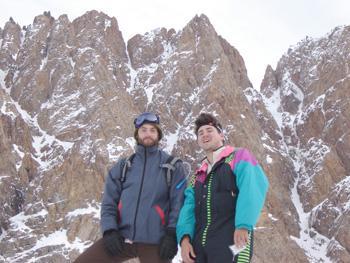Now that the LSU group has left me alone in Argentina and returned to the United States, I no longer have anyone looking out for my well-being, and no one is making plans for me. This is why my first excursion outside Buenos Aires this weekend will help me decide how capable I am of taking care of myself in Argentina. To raise the stakes even higher, my friend, Bryant, is visiting me for a week and does not speak or understand any Spanish. If anything happens to him or if our travels are a miserable failure, I will hold myself responsible. I have to admit we came pretty close to disaster, and the reason we avoided it was because of the random and unnecessary kindness of three strangers. Our excursion started after we checked out of the hostel and dragged our luggage to the nearest intersecting street, 9 de Julio Avenue, which holds the world record for being the largest avenue in the world. We had plenty of time to get to the bus station, but the taxi drivers would not pull over for us because it was rush hour and we were standing next to a ton of luggage. This is a familiar and totally frustrating phenomenon in Buenos Aires. I started to panic as the moment approached when our $50 nonrefundable bus tickets would become more useful as toilet paper than as anything else. Everything was looking bad until the manager of our hostel called a cab for us and explained to the driver the seriousness of our situation, which would have taken me five minutes and ruined our chances. Next, the taxi driver told us exactly which doors we should enter and where our gates would be inside the station as he drove like a madman through the streets and parking lots of Buenos Aires, crossing into oncoming traffic lanes and swearing at slow drivers. Inside the station, Bryant and I found our gates and were relieved to see a bus with “Mendoza” written across the top. We calmly handed the driver our tickets, and he quickly handed them back to us with a cold, unexplained “No.” This would have certainly been the quick and painful end to our trip to Mendoza, but a passing employee of the station heard my desperate sigh of confusion and approached us. She read our ticket, and without a moment of hesitation, she took off toward the other side of the station and uttered the one syllable that saved our four night trip to Mendoza: Veni (“come” in Castellano). She trotted 20 feet ahead of us in her flight attendant-like mini skirt and high heels as we dragged our clumsy luggage behind us. We were surprised when she ran right outside of the building. We were confused when we crossed an empty parking lot.
Nearly 200 yards later, we were astonished as she ran down the crosswalk of a busy intersection and stopped the regular traffic to flag down a double-decker bus, which read “Mendoza” across the top. The drivers and passengers glared at us perplexedly. We sat there dumfounded as she convinced the drivers to let us on the bus after they had already given our seats to someone else.
All I could think to do before we boarded the bus was give her an awkward kiss on the cheek (I still don’t have that down) and say, “muchas muchas gracias.” Next, we and the 50 other passengers, who had already begun the voyage in their minds, waited 30 minutes as the same woman backtracked to the station to retrieve our dinner for the 14 hour drive to Mendoza. The incident was ridiculous and renewed some of my faith in the human race. After we arrived in Mendoza, we reunited with my roommate, Curtis, and his girlfriend, Pam. The following day, the four of us rented some absurd snowboarding clothing and equipment from the ’80s and headed to the mountain. The whole snowboarding adventure, including the two hour bus trip into the Andes, lift tickets, equipment and clothes cost less than $100. I’m still in Mendoza right now, and the trip has been great, but the most impressive event so far has been the kindness that people are capable of here.
—Contact David McCoy at dmccoy@lsureveille.com
Rare kindness of strangers spans across cultures
July 17, 2007




